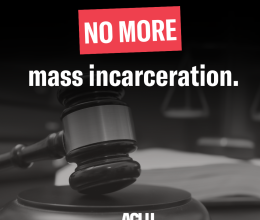Like many New Mexicans, I live with felony convictions dating back decades. Slightly more than 20 years ago, an Albuquerque police officer arrested me for taking an end table off of my neighbor’s sun porch and charged me with residential burglary — a third degree felony. I pleaded guilty and the judge sentenced me to 18 months in prison followed by five years of probation and two years of parole.
After I completed my original sentence, I had a few brushes with the law, mostly for misdemeanor offenses and traffic violations. However, about five years after that first felony arrest I found myself once again in the back of a police car facing felony charges.
Although the underlying offense of shoplifting over $250 wasn’t as serious as the earlier burglary charge, I accepted a seven-year plea deal out of fear of being convicted on the other more serious charges the police officer piled on for “wiggle room.”
Getting arrested over and over again left me feeling ashamed until I learned my recidivism was a symptom of a much larger issue — the inability to put one’s criminal past behind them. Each time I got released from prison or jail, my criminal records impeded my transition from prisoner to productive citizen by blocking access to gainful employment and safe housing—until I got lucky.
I got lucky because my job search brought me to the Rio Grande SUN where Publisher Bob Trapp and former news editor Jennifer Garcia hired me, even after finding out about my criminal past.
The only time my convictions were ever mentioned was during a conversation I had with Garcia. She wanted to warn me that some of the people I was hired to hold accountable, as a newspaper reporter, may try to use my past against me, especially since my criminal records are online for all to see.
I worked at the SUN for about four years, which is the longest I kept any job. In fact, it was the first job I ever quit. I left to work on criminal justice reform at the American Civil Liberties Union of New Mexico.
It has been more than 13 years since my last felony conviction. Although I have experienced some success, I still face limitations on where I can work and live. I am not alone in this struggle.
The problem is so widespread that according to the National Employment Law Project one in three adults or 65 million Americans have criminal records. That means there are some 65 million Americans who face obstacles securing safe housing, employment, and education, which are widely considered major ingredients in the recidivism-reduction recipe.
The good thing for many of those 65 million Americans is that they probably live in a state that has some type of second-chance legislation like expungement that allows them to move forward with their lives.
Unfortunately New Mexico is one of only a handful of states that permanently brands its citizens by not having any meaningful path for people to clear their records. However, with the successful passage of House Bill 370, the Criminal Records Expungement Act, we have an opportunity to change that and give New Mexicans a chance to move on with their lives.
Having a system that allows one to have their criminal records removed from public view benefits the entire community and not just the individual.
A recently released University of Michigan report shows people who successfully have their records expunged tend to re-offend at rates lower than the general public. This finding speaks directly to the “public-safety objection” that is often used to oppose expungement efforts.
This carefully constructed bill gives those living with felony convictions a second chance while still taking into account the public’s need to know. The bill achieves this balance by providing for a hearing before the court in which officials from the arresting agency and district attorney’s office will have an opportunity to object to an expungement petition, and ensures that law enforcement personnel continue have access to an individual’s expunged records when needed.
HB 370’s overwhelming success this legislative session has been a long time coming. In the last 10 years, two similar bills made it to the desk of governors Bill Richardson and Susana Martinez only to be vetoed. Now Governor Lujan Grisham has an opportunity to get smart on crime where her predecessors failed. With her signature, we can clear the path forward for formerly incarcerated people to fully reintegrate into society as productive citizens.
I know first hand how difficult and defeating it can be to try to reintegrate into society and live a healthy lifestyle only to have doors slammed shut because of past mistakes. And, while I am very grateful to have stumbled upon an employer who treated my criminal records as if they were expunged, folks living with convictions need good policy not good luck.
New Mexicans are ready for a new, smarter approach to tackling crime in our state. A New Mexico SAFE poll conducted last fall found that 72 percent of New Mexicans support removing barriers that block people with criminal records from gaining employment, housing and educational opportunities. It is my hope that our new governor will recognize the will of New Mexicans and seize the opportunity we have before us by signing HB 370 into law.
This article was originally published in the Rio Grande Sun.







